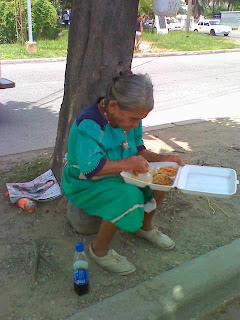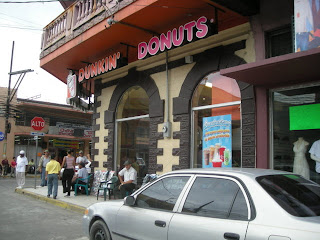In an incredible coincidence, the very day after I posted the article about the Christmas Eve power pole incident, La ENEE came out and replaced it.
Was someone from the power company reading the Blogicito and said, "Hey, we need to get out there TOMORROW and do that repair!"?
Nah. Don't be ridiculous.
Is La Gringa psychic?
Nah. I predicted it would never be replaced.
Is someone else in the neighborhood rich and powerful with those kinds of connections?
That is probably the best guess.
Anyway, it's done and it was done pretty quickly. They only turned our power off for a couple of hours.
Notice how in my Honduranized thinking, I did not say, "Damn! It took them three months to replace the damaged pole." I say instead, "It was done pretty quickly." referring to getting the new pole installed in a few hours. Life is more content with lowered expectations.
Telephone Poles?
By the way, I don't know why I call this a 'telephone pole'. We've been waiting for a telephone line to our house since we got on the list for telephone lines in February 2002, before we even built our house. Hardee-har-har.
We apparently didn't pay the right person. Now I'm on my high horse and don't even want a landline from Hondutel. Right now there is a new scandal, supposedly involving Hondutel employees and 'black' traffic, in which poor innocent users are getting monthly phone bills for L.10-20,000 (US $529-1,058) and more in an attempt to cover up the illegal usage.
What do you call those tall poles that hold the wires? I call them telephone poles regardless of exactly what kind of lines they carry. It may not make sense but I always have. This habit is causing a cultural divide in my house. Every time I say 'telephone pole', El Jefe frowns at me and says, "I don't know WHY you call that a TELEPHONE pole."
So, I have been trying to be more precise and refer to it as a 'power pole'. Thinking about it, it may be that telephone lines have been so rare in many parts of Honduras for so many years that it would be ridiculous to call them telephone poles. It wouldn't make any more sense than calling pedestrian walkways in New York City 'deer crossings'. Yeah. I get it now.
In return, I would like all Hondurans to refer to electricity as 'electricidad' and not luz (light). ;-D










































 Welcome to my Blogicito —
Welcome to my Blogicito — 








